Family health managers
Posted on November 20, 2009, by mercedes, under Gender Masala, children, culture, health, women, men and more.
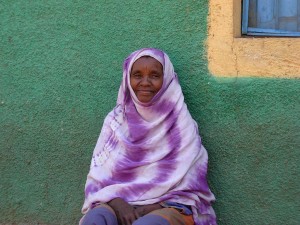
Women manage family health in Ethiopia.
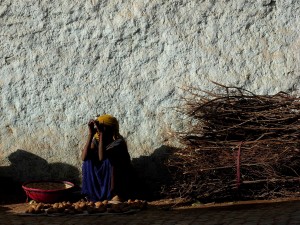
Pics by M. Sayagues
98 Comments
Foreign aid, elites and entrepreneurs
Posted on September 28, 2009, by mercedes, under Gender Masala, women, men and more.
On my way to the Sao Nicolau waterfall on the island of Sao Tome, I stumbled upon two Jurassic Parks of failed industrial development.

Ghost factory. By M. Sayagues
At the coffee plantation Monte Café, to the left of its dilapidated pink colonial buildings, stands a huge shed. The caretaker unlocks a gigantic padlock and we step into a surreal décor for a tropical Blade Runner movie.
The shed houses a web of pipes and drums, coffee-processing machinery made by the Brazilian company Pinhalense. It is huge, complex – and never used.
The caretaker remembers when the machines were put in place, about a decade ago, but he never saw them working.
Donors pulled the plug on this US$24 million project after US$14 were spent and a few siphoned off. (more…)
83 Comments
Putting a value on our work
Posted on September 24, 2009, by mercedes, under Gender Masala, culture, media, women, men and more.
Guest blogger: Miren Gutierrez, IPS editor-in-chief
Seven PM at the supermarket. After a long day at the office, she is standing in line to pay for groceries to make dinner, stealing glances at her watch, grappling with two young kids who want her to buy some chewing gum…
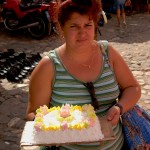
Unequal sharing of the work pie. M. Sayagues
Does this picture ring a bell? Survey after survey across the world report that women put in between 20 and 30 hours a week of domestic and family work. Unseen, unsung and unpaid, yes, but not insignificant.
Unpaid work in the home, done mainly by women, is estimated at approximately 50 percent of all productive activity even in industrial countries, and as much as 60-70 percent in many developing countries,” says Hazel Henderson in an interview with IPS. (more…)
77 Comments
Breakthrough for Women at the UN
Posted on September 18, 2009, by mercedes, under Gender Masala, human rights, media, politics, women, men and more.
Guest blogger: Ann Ninan, IPS Gender Editor
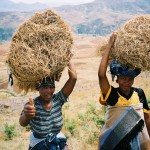
A breakthrough for us as well? M. Sayagues
The UN has finally decided to stand up for women! A decision to create a new agency for women was taken by the General Assembly on September14.
Our colleague Thalif Deen, IPS bureau chief in New York, was the first and only journalist to report it for the first several hours.
But this blog is not to crow about our scoop.
I’m quite excited by the prospect of a new women’s agency with money and political power. No longer will the world’s feminists have to lobby from the outside to put their views on the table. They have now won admission to the high table.
Any one of those bright, articulate, activist women can emerge to lead the agency. The reality is likely to be less rosy. But chances are that, because it’s new, it will be less under the thumb of the old boy network.
You think I’m a romantic? What the hell, there is no harm in dreaming, is there? (more…)
187 Comments
Missing the Point? A critical review of MDG
Posted on September 14, 2009, by mercedes, under children, health, human rights, women, men and more.
Next time you read a story or a press release moaning about how country X will not reach the Millennium Development Goals, think twice - whose goal and whose target is it? We know the deadline but do we know the baseline?
Instead of striking a balance between ambition and realism, the MDGs have become “money-metric and donor-centric”, “meaningless catch-all phrases.”
So says Jan Vandemoortele, a Belgian national, a United Nations senior official and one of the architects of the MDGs, in a thought-provoking article in the July issue of Development Policy Review of the Overseas Development Institute. (read it here)
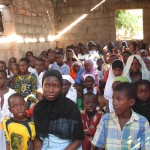
Unrealistic goal? A crowded classroom in Guinea Bissau...
The author recalls that the MDGs were set up in 2000 as collective targets based on extrapolations of global trends. They are vague by definition; they are not one-size-fits-all.
Instead, one should look at countries’ historical backgrounds, natural endowments and specific problems, then adapt the Goals to each circumstance, as Mozambique, Cambodia and Ethiopia have done.
Otherwise, this puts undue pressure on the poorest countries and, given that most of these are in Africa, nurtures Afro-pessimism.
For example, the global target for education “is not realistic” for countries in conflict, he says. (more…)
81 Comments
No longer invisible: caregivers speak out
Posted on September 4, 2009, by mercedes, under Gender Masala, HIV/AIDS, culture, human rights, media, violence, women, men and more.
Guest blogger: Glenda Muzenda, Care Work Manager at Gender and Media Southern Africa (GEMSA)
I just attended the Grassroots Women’s International Academy on Home Based Care in Johannesburg, South Africa.
It was a mixed bag of fun meeting women from all walks and works of life from Kenya, Cameroon, Uganda, Malawi, Nigeria, Ethiopia, Rwanda, Zambia, Ghana, Namibia, Zimbabwe, and South Africa.
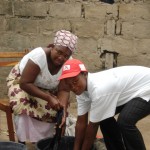
Caregiving in Mozambique. Photo: Janine Morna
The Huairou Commission and the Land Access Movement of South Africa brought us together to share experiences of home-based care.
It is fascinating how in Malawi the care givers alliance has moved forward. Victoria Kalomba, of the Malawi Group of Women Living with HIV and AIDS told us that the ministry of health and social development had spearheaded a campaign to raise awareness about people infected and affected by HIV.
The process had the ministry informing the support groups of individuals who had tested positive after visiting clinics so they could be reached and helped.
I am worried about this way of outing positive people even in the aim of mobilizing support groups. I feel that it is a human right violation to have to give information of someone’s HIV status.
109 Comments
Timeless wisdom: traditional healing in Africa
Posted on August 31, 2009, by mercedes, under Gender Masala.
Tall, thin and dreadlocked, Kwame Sousa is an artist, a documentary film producer, and an avid soccer player. Whenever he sprains a muscle, he visits his granny or the neighbourhood traditional healer for a rub with a homemade herbal potion.
“It smells strongly of wine gone vinegary but it works ,” he says.
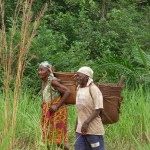
The forest is their pharmacy. Photo: M. Sayagues
Last year, when he was scratching madly with chickenpox, his granny’s ointment of coconut oil and leaves relieved the itchiness.
When his friend Geane Castro feels a cold coming, his grandmother makes him a hot bath with water infused with leaves and bark, then a special tea with plants she gathers in the forest. Presto, he recovers.
I meet them at Teia D’Arte, an art gallery in Sao Tome, the capital of the tiny two-island nation of Sao Tome and Principe, off the coast of Gabon.
With a rich biodiversity of 600 botanical species and 132 endemic plants, the islands’ rainforest is a well-stocked pharmacy for herbalists.
Their knowledge is captured in a decade-long ethno-pharmacological study published last year. Researchers worked with 40 traditional healers, midwives and grandmothers to identify and classify 325 medicinal plants, note 1,000 recipes and test 25 plants in the lab. Many look promising for developing new medicines. (more…)
53 Comments
Rubbing it the wrong way: condom-grabbing tourists
Posted on August 20, 2009, by mercedes, under Gender Masala, HIV/AIDS, health, media, stereotypes, women, men and more.
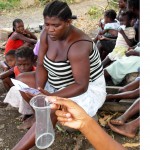
A Femidom demo. Photo: M. Sayagues/Irin
In a contest for irresponsible tourism, taking the last two female condoms at a Botswana border post as a souvenir would run neck-and-neck with littering the Central Kalahari Game Reserve with soda cans. Hey, spare a thought for a sister: a local woman might need them. I mean the condoms, not the soda cans.
Journalist Bridget Hilton-Barber writes, in the South African weekly Mail & Guardian, about the female condom’s popularity among Batswana women. (Femidoms rub the right way, 14 August). Then she plucked the last ones at the border post, as a souvenir, to lie in her office drawer.
Well, their popularity is a very good reason to leave the condoms in the box for someone who wants to use them.
Correction: Someone who needs to use them.
An average of three out of ten pregnant women at public antenatal clinics in Botswana are HIV-positive. This is an improvement over ten years ago, when four or five out of ten pregnant women were HIV-positive. Condoms helped achieve this drop. (Read about AIDS in Botswana here) (more…)
105 Comments
Gabon’s people-friendly hospital
Posted on August 11, 2009, by mercedes, under Gender Masala, culture, health, women, men and more.
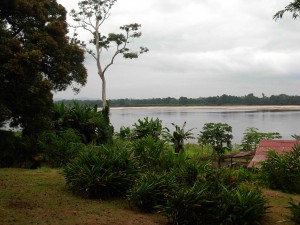
The Ogooué River seen from Dr. Schweitzer's home. Photo: M. Sayagues
I decided to visit my Nicaraguan friend who stays in a village called Fougamou, in central Gabon. So I looked up the nearest town, Lambaréné. It turned out to have a museum honouring Dr. Albert Schweitzer, who arrived there in 1913, built a hospital, and won a Nobel Peace Prize in 1952.
I had never been interested in him but it seemed like a truly off-the-beaten path museum, just my kind. But what sold me on Lambaréné was the name of its river: Ogooué. I HAD to see a river with such a wondrous name.
So I set off to Lambaréné on my way to Fougamou. Believe me, I was in the green heart of Africa. Green, as in rainforest.
I am glad I went. The river is awesome. The museum is charming. It preserves the old hospital and personal quarters from the 1920s as they were originally. (more…)
123 Comments
Soccer, xenophobia and masculinities
Posted on July 13, 2009, by mercedes, under Gender Masala, human rights, violence, women, men and more.
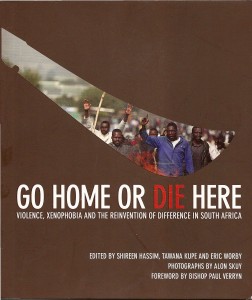 When friends ask me about the World Soccer Cup in South Africa in June 2010, I say there is only one if, but a big if.
When friends ask me about the World Soccer Cup in South Africa in June 2010, I say there is only one if, but a big if.
What if another wave of xenophobic violence unfurled, like the one that shook South Africa to the core a year ago? It left 50 dead and about 150,000 displaced, terrified and destitute immigrants – black, African and foreign. (Click here to see a slideshow)
The army stepped in and the violence subsided. But xenophobia still simmers. In June, IPS reported on yet more murders of Somalis in the Western Cape province. (more…)

